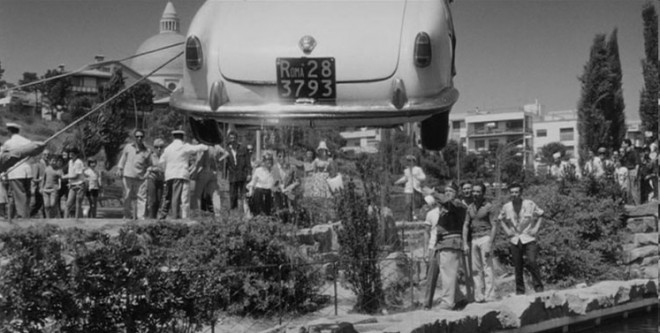One of my favorite German filmmakers is Margarethe von Trotta, whose art is fresh, lucid, graceful, incisive, politically probing. Sheer Madness (1982) and Rosa Luxemburg (1985) are great, complex works, and Sisters; or the Balance of Happiness (1979) and Marianne and Julianne (1981) aren’t far behind. (Since the mid-1990s, von Trotta’s work, done for German television, has regrettably eluded my viewing range.) All this praise is by way of introducing The Promise (Das Versprechen), my least favorite von Trotta film, one so facile that it positively ingratiates. About East and West Germany, and therefore about Eastern and Western Europe, the film fails to achieve the intriguing revelations of Krzysztof Kieślowski’s The Double Life of Veronique (1991).
The Promise spans the duration of the Berlin Wall by following a couple of sweethearts separated by it following its construction in 1961. As far as I can tell, the film illustrates a single point: “It seems only the Wall kept up the illusion that all that divided the German people was a wall.” Von Trotta, herself a Berliner, doubtless is sincere; but her normally quiet, thoughtful work gives way here to a piece that plays like emotional gangbusters. Get out your handkerchiefs.
Sophie and Konrad, high school graduates, live in East Germany. Months after the Wall’s completion they join others in planning to escape to the West through the sewers. But at the last poor Konrad, whose shoelaces are forever coming unraveled, trips, and a surveillance tank’s rolling through requires his remaining behind to replace the manhole cover in order to protect the others. However, he has told his sweetheart he will soon follow. Hence the title, The Promise—although this, as we shall see, comes also to reflect ironically on what awaits East Germans on the other side.
Konrad’s promise to Sophie isn’t kept. (This is a film about broken promises; it’s a politically slanted soap opera.) Family ties weigh in (à la The Sin of Madelon Claudet), in addition to which, once his father turns him in to authorities for the planned escape, Konrad is tightly monitored as a security risk. (Is von Trotta trying to recall Pudovkin’s 1926 Mother?) In 1968, however, Sophie and Konrad do manage to meet in Prague, where they conceive their son, Alexander, and Sophie even decides to move there, which is presented as some sort of a sacrifice (moving back to the East, that is), and where Konrad will arrange to continue his scientific research. Alas, then Soviet tanks start rolling in. Nevertheless, Alexander keeps both parents connected over the years; but when an official cancels the father-son visits and Konrad assaults him, Konrad and Sophie lose touch again. Then in 1989 the Wall comes down. Brought together by their son in the celebratory streets, the two principals exchange a look across a gulf. It’s doubtful they can ever be a couple again. But their multicolored memories will always remind them of the way they were.
Von Trotta certainly hasn’t failed to provide an absorbing tale, and the film’s broad, sweeping historical canvas is, frankly, irresistible. Too, the acting is excellent, especially that of Corinna Harfouch as the mature Sophie—different actors play Sophie and Konrad as teenaged children—and Eva Mattës as Barbara, Konrad’s sister, an unorthodox pastor. Still, I find the film contrived, reductive and even silly. Sophie is half-right that Konrad’s ambivalence rather than unlucky circumstance kept him from joining her. So what? She could as easily—more easily—have rejoined him in East Berlin. If she had done so, presumably following her heart, she would have also been able to leave behind the poverty, homelessness, dereliction and street prostitution that we (too) briefly glimpse in the city’s western part—the side effects with which capitalism burdens freedom. I appreciate her Prague decision, but I can’t imagine that even Sophie blames Konrad for the exercise of crushing power by invading Soviets. Konrad’s ambivalence, shmambivalence. What about Sophie’s? I’m left uncertain as to whether it’s a fault of Peter Schneider’s script and von Trotta’s treatment of it that Sophie doesn’t address her own ambivalences or whether that that is part of their point. For sure, Sophie is too intent on finding in adolescent Konrad’s trip a Freudian slip.
People who resist psychoanalyzing themselves have no business psychoanalyzing others.

I teach German at Berea College. I would like to make five DVD copies of Das Versprechen (The Promise) – one for each member of my class; my students need some practice listening to the dialog The Audio Services Dep’t. will not make copies because of copyright issues. They gave me your website address so I could try to get permission from you to make these copies. This film is unavailable on DVD. Have I contacted the right person?
Thanks,
Newell Jones
Instructor of German, Berea College, Berea, Ky.